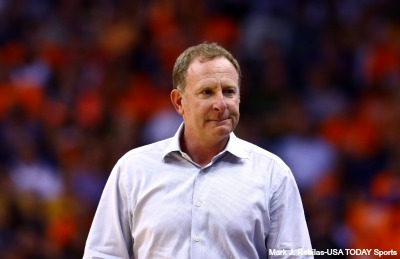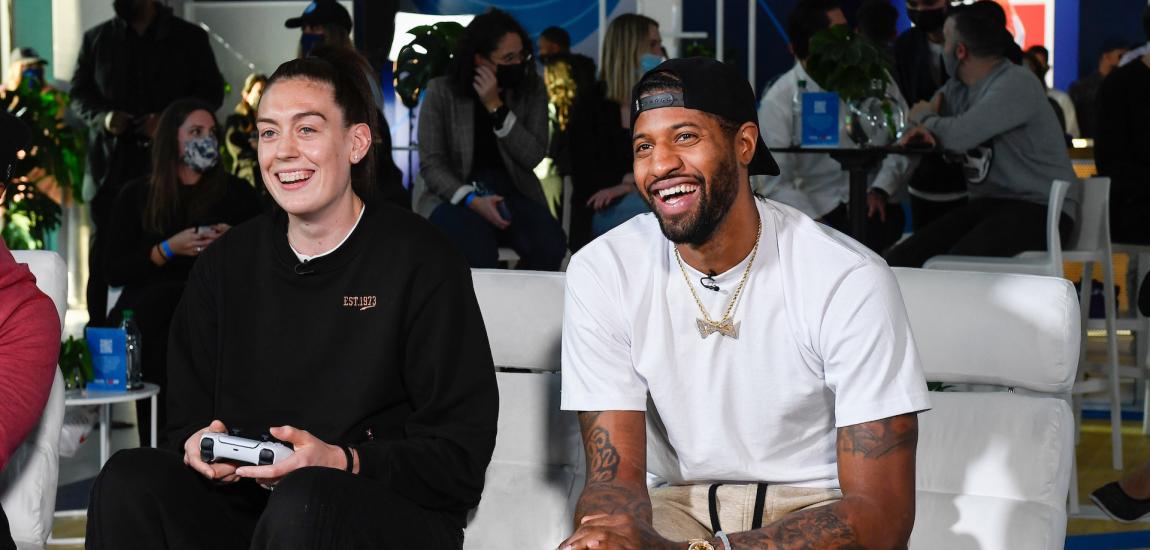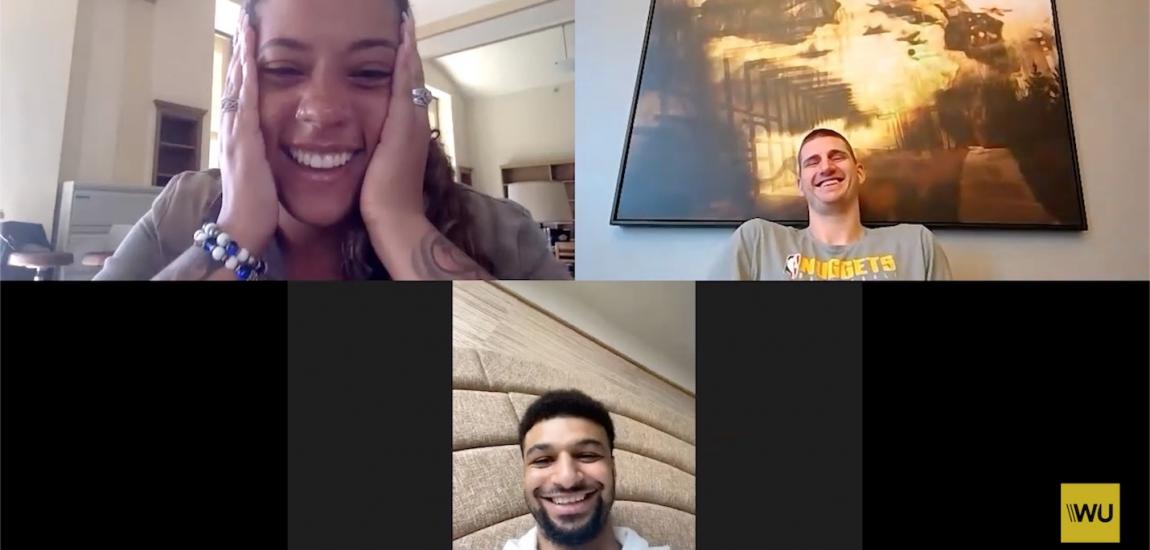The plague of millennials knows no bounds, apparently. In the process of inheriting a broken political system, a wounded economy and predatory college tuition costs that -- sorry, old folks -- are way, way, way more expensive than anything you ever faced back when you had to walk to school uphill both ways, we have also managed to wield our collective power in destroying hallowed institutions once thought invincible.
Yes, I am referring to the Phoenix Suns.
Not long ago, the Suns were a darling of the NBA. Their future seemed so bright that, as I write this, I have to actively remind myself that the team's once-brilliant potential has gone up in smoke. The Phoenix Suns that had an innovative backcourt, a blossoming star in Goran Dragic, a bevy of first-round picks and an enterprising rookie head coach now has none of those things.
Presently, the Suns are 12-25, losers of nine straight, and almost entirely hopeless. The team's owner, Robert Sarver, knows exactly where to pin the blame. When asked about the continued friction between the team and stretch forward Markieff Morris -- who publicly asked for a trade this summer and earned a two-game suspension this season for throwing a towel in his coach's face -- Sarver was ready with a quick retort.
"My whole view of the millennial culture is that they have a tough time dealing with setbacks, and Markieff Morris is the perfect example," he told the Arizona Republic. "He had a setback with his brother in the offseason, and he can't seem to recover from it.
"I'm not sure if it's the technology or the instant gratification of being online," Sarver continued. "But the other thing is, I'm not a fan of social media. I tell my kids it's like Fantasyland. The only thing people put online are good things that happen to them, or things they make up. And it creates unrealistic expectations."
Setbacks? Unrealistic expectations? Instant gratification? OK then: Let's see if a millennial can piece together what killed the Phoenix Suns. But instead of taking one rich white man's observations at face value, let's test a different hypothesis: That the Phoenix front office, including Sarver himself, is primarily to blame for the Viking funeral that has become the Suns' 2015-16 season.
Setback: Phoenix Alienated its Best Player
When the Suns were burning brightest -- when its team-building strategies were drawing high praise and its future being the envy of team around the league -- Phoenix was quarterbacked by Goran Dragic. Dragic was half of an innovative backcourt that paired two points guards in the starting lineup.
In that 2013-14 season, Dragic and Eric Bledsoe proved a great fit because of their passing and scoring abilities, their ability to each work off the ball, and the chemistry they developed on the court. The Suns were rich with draft picks and young talent, but expected to struggle in the upcoming season.
Enter Jeff Hornacek, who came in as a rookie NBA coach and maximized the team's potential. Phoenix went a stunning 48-34, just missing out on the playoffs. Dragic was named the NBA's Most Improved Player. This team was supposed to be terrible; instead, it was downright good, and it still had both salary cap space and extra draft picks in its pocket to fill out the roster.
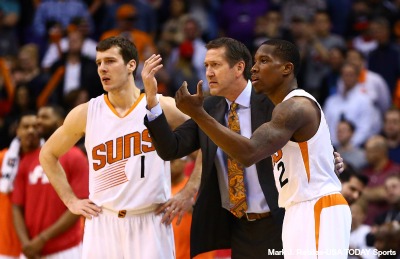
The most important roster move was the addition of Isaiah Thomas, an on-ball point guard. Outsiders found it a curious move, given that Phoenix already had so much depth at point guard. Dragic found it much more problematic. It changed his role with the team for the worse, taking some of the ball-handling out of his hands. As the trade deadline that season approached, Dragic, who was set to be a free agent, told reporters there was "no way" he would re-sign with Phoenix.
"I don't trust them anymore," Dragic said after practice one day. "It happens too many times. Two, three times.
"They give promises, OK. It's hard. ... I just hit that point of my career that it's better for me and my family to move on."
Dragic also said that the team was "not going the right direction." That's only partially true: The team had started a respectable 28-20 and had playoff aspirations. But the Suns dealt Dragic away at the trade deadline, and Thomas, too. A completely remade roster went a disappointing 11-23 the rest of the way, missing the playoffs.
Unrealistic Expectation: LaMarcus Aldridge Did Not Walk Through That Door
The late-season slide did not seem particularly threatening. Phoenix had cash to burn this offseason, and it planned on making a run at a top free agent. That wound up being LaMarcus Aldridge, whose tenure in Portland had come to a close. Phoenix's team-building strategy had changed by this point: After its surprise success, Sarver and Suns GM Ryan McDonough had set their sights on playoff contention. This past offseason, the goal was adding the pieces needed to become a top playoff team.
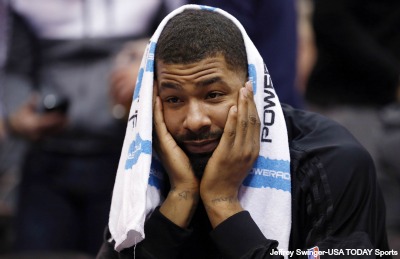
The team was desperate to land Aldridge, and to do that, they sweetened the pot by signing Tyson Chandler to a four-year, $52 million deal. The back end of the deal looked bad, but the Suns needed him to win over Aldridge, so they were happy to take on some bad money down the road.
But you know what happened: Aldridge didn't come to town, instead signing with San Antonio. Phoenix never filled the hole carved out for him. And Chandler's disappointing play this season has made Phoenix regret the entirety of his fat contract -- and that financial cloud will hang over them until 2019.
Instant Gratification: Expectations Eclipsed Reality
The fundamental problem that brought down Phoenix is a philosophical one: The team began to chase expectations greater than its reality. Yes, the 2013-14 squad was a shocking upstart, one that accelerated the team's timeline. But when the wins started to come early, the team abandoned its long-term strategy for a win-now approach, even as the majority of its roster endured a turnover. The team that won 48 games two years ago is not the team currently playing in Phoenix.
Players are frustrated, the coach's top assistants have been fired and there's no easy path back to success. The more likely solution is to tear it all down and start from the beginning -- this time without the same assets as before. Interestingly, Sarver himself could have mitigated much of this disaster. The team could have treated Dragic better, remained patient with its team-building and managed its assets wisely.
Instead, it gambled and lost. Sarver wants to point fingers over the Suns' fallout, but his description of "millennial culture" more accurately describes himself.
-- Follow Jonathan Crowl on Twitter @jonathancrowl.


